|
|
|
Sort Order |
|
|
|
Items / Page
|
|
|
|
|
|
|
| Srl | Item |
| 1 |
ID:
040923
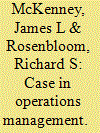

|
|
|
|
|
| Publication |
New York, John Wiley and Sons, Inc., 1969.
|
| Description |
xiii, 311p.Hbk
|
|
|
|
|
|
|
|
|
|
|
|
Copies: C:1/I:0,R:0,Q:0
Circulation
| Accession# | Call# | Current Location | Status | Policy | Location |
| 002506 | 658.4034/McK 002506 | Main | On Shelf | General | |
|
|
|
|
| 2 |
ID:
106001
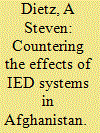

|
|
|
|
|
| Publication |
2011.
|
| Summary/Abstract |
The current approach to countering the threat of improvised explosive devices (IEDs) in Afghanistan has met with limited success. The relative lack of success may be in part because the current approach is not holistic and discounts the social systems that foster the IEDs. Insurgents are using IEDs as a tool to further their strategic aims, but the coalition and to a lesser extent the Government of the Islamic Republic of Afghanistan (GIRoA) are attacking the IEDs as if they are an end in and of themselves. Combining network disruption with information change maximizes the opportunities for mitigating the IED threat. More specifically, to mitigate the IED threat requires disrupting the social and economic systems associated with IEDs, and at the same time providing alternative economic opportunities and improving rule of law and governance at the local level. In other words, counter-IED (C-IED) must be Counter-Insurgency (COIN) centric to be successful. This paper reviews the current state of C-IED efforts, identifies five main problems with the current approach, and suggests changes to reduce or mitigate the IED threat in Afghanistan.
|
|
|
|
|
|
|
|
|
|
|
|
|
|
|
|
| 3 |
ID:
133720
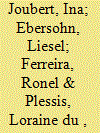

|
|
|
|
|
| Publication |
2014.
|
| Summary/Abstract |
The purpose of this study was to explore and describe the nature of a reading culture in a rural secondary school in South Africa before and after a literacy intervention. The systems theory with interpretivism as the epistemological paradigm was employed. A rural secondary school was selected as part of an on-going Flourishing Learning Youth and Supportive Teachers Assets and Resilience studies on resilience and rural schools. Language teachers (n = 6, male = 1, female = 5) were purposively selected to participate. The literacy intervention was developed with phonetic acquisition as the basis to develop reading skills. It became evident that implementing English (additional language) as teaching and learning language in the school may have contributed to barriers to learning. Limited resources and reading instruction training exacerbated the problems. However, once the teachers acquired new skills and the children received the needed support, the improvement in overall academic achievement was significant.
|
|
|
|
|
|
|
|
|
|
|
|
|
|
|
|
| 4 |
ID:
120305
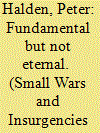

|
|
|
|
|
| Publication |
2013.
|
| Summary/Abstract |
Although the public-private distinction is a historical construction it has been deeply internalized and taken for granted in Western ways of thinking about society and politics. Therefore, we often apply it uncritically as a way to categorizing and coding non-Western societies. Doing so unreflectively may distort our observations as well as policies of state- and peacebuilding. I outline the history of the public-private distinction by emphasizing its role in state-formation processes. This distinction was essential to the formation of the state and society as distinct categories. Indeed, it was and is a pre-condition of the autonomy of the state.
|
|
|
|
|
|
|
|
|
|
|
|
|
|
|
|
| 5 |
ID:
061234
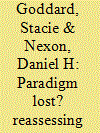

|
|
|
| 6 |
ID:
175129
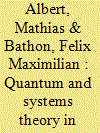

|
|
|
|
|
| Summary/Abstract |
This article provides a sympathetic, yet also somewhat critical, engagement with the notion of ‘quantizing’ by exploring substantive overlaps between quantum and systems theory. It is based on the observation that while quantum theory is ‘non-classical’ in its entire world-view, there is a danger that when it comes to the social world it is simply laid on a world-view of that world, which remains at its core ‘classical’. This situation calls for engaging quantum with existing non-classical social theories. Resemblances between quantum and systems theory are obviously given through similarities around the concepts of observation and meaning, whose status and function in both bodies of theory is explored. We then probe the degree to which obvious analogies in fact could be read as overlaps and similarities that could be put to complementary analytical use: in a sense, we argue that systems theory ‘does’ quantum theory, and vice versa. The article concludes with some vistas of this discussion for the field of international relations.
|
|
|
|
|
|
|
|
|
|
|
|
|
|
|
|
| 7 |
ID:
040880


|
|
|
|
|
| Publication |
New Jersey, Prentice-Hall, 1971.
|
| Description |
xvi, 494p.Hbk
|
|
|
|
|
|
|
|
|
|
|
|
Copies: C:1/I:0,R:0,Q:0
Circulation
| Accession# | Call# | Current Location | Status | Policy | Location |
| 007423 | 658.4034/STA 007423 | Main | On Shelf | General | |
|
|
|
|
| 8 |
ID:
077412
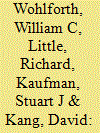

|
|
|
|
|
| Publication |
2007.
|
| Summary/Abstract |
The balance of power is one of the most influential theoretical ideas in international relations, but it has not yet been tested systematically in international systems other than modern Europe and its global successor. This article is the product of a collective and multidisciplinary research effort to redress this deficiency. We report findings from eight new case studies on balancing and balancing failure in different international systems that comprise over 2000 years of international politics. Our findings are inconsistent with any theory that predicts a tendency of international systems toward balance. The factors that best account for variation between balance and hegemony within and across international systems lie outside all recent renditions of balance-of-power theory and indeed, international relations scholarship more generally. Our findings suggest a potentially productive way to reframe research on both the European and contemporary international systems.
|
|
|
|
|
|
|
|
|
|
|
|
|
|
|
|
| 9 |
ID:
129618


|
|
|
|
|
| Publication |
2014.
|
| Summary/Abstract |
The aim of this contribution is to present a conceptual framework with potential application across the interdisciplinary field of border studies. This framework should embrace interdisciplinarity and the contextual nature of borders. Based on the systems theory of Niklas Luhmann, it elaborates an understanding of borders as being related to a dynamic process of social bordering/bounding processes that involves spatial, social, and conceptual boundaries. By introducing the notion of 'empirical boundary', our framework aspires to bridge the gap between (radical) constructivist theorising and the analysis of physical realities involved in the (re) production of boundaries.
|
|
|
|
|
|
|
|
|
|
|
|
|
|
|
|
| 10 |
ID:
177192
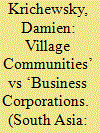

|
|
|
|
|
| Summary/Abstract |
India’s current ‘pro-business’ development regime has been both challenged by depictions of malevolent corporations oppressing helpless village communities and legitimised by depictions of socially responsible corporations ‘developing’ grateful backward communities. To overcome these contradictory narratives, which fail to account for the intricate relationships between villagers and corporate actors, the article analyses how these narratives are constructed in interaction with local conflicts surrounding industrial activity. Guided by a framework based on social systems theory, a detailed study of two cement plants located in Chhattisgarh shows how this interaction operates through multiple discursive layers, which vary in terms of their degree of specification/generalisation and concreteness/abstraction.
|
|
|
|
|
|
|
|
|
|
|
|
|
|
|
|
|
|
|
|
|